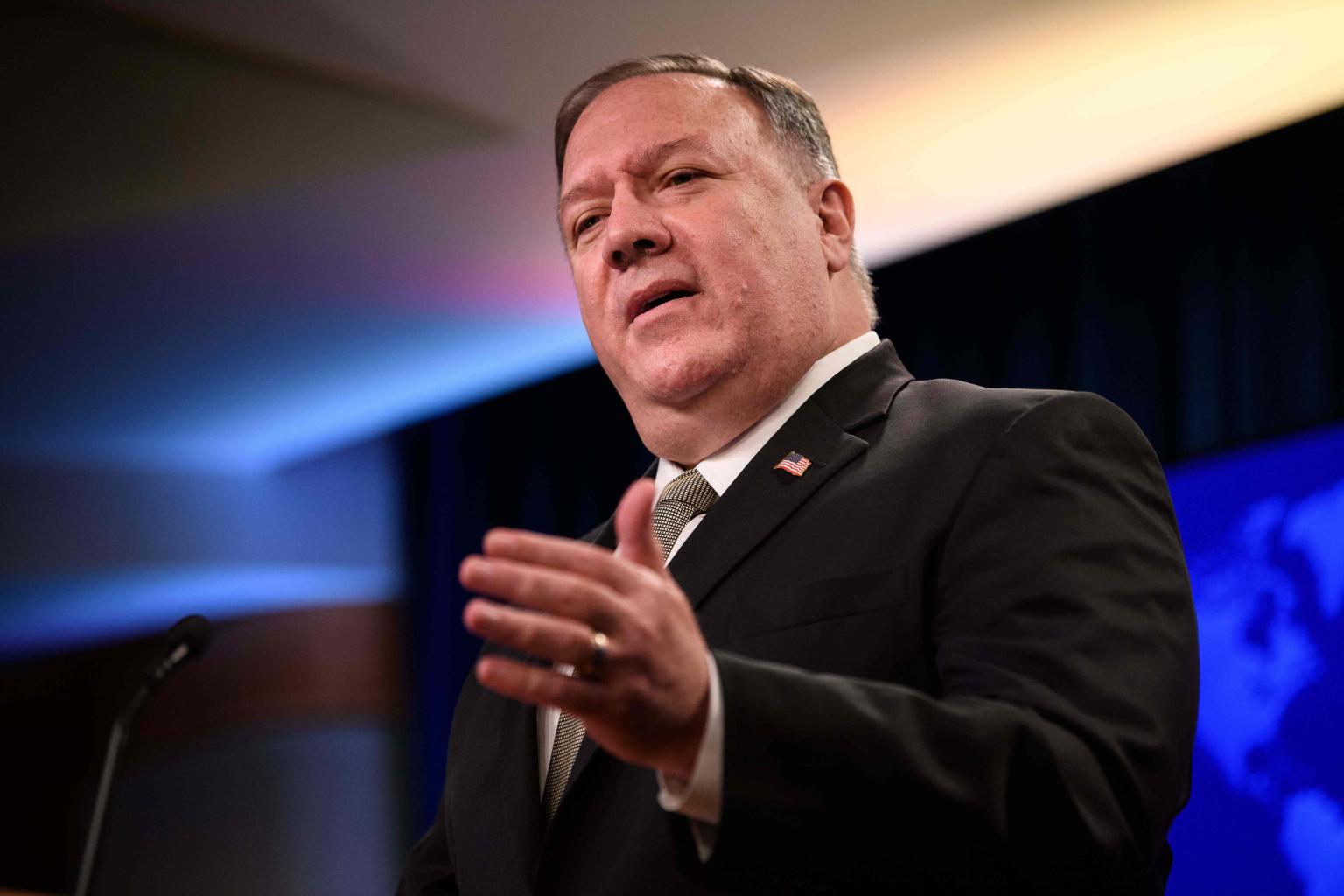US remains committed to Asean amid China's 'escalating aggression', says Pompeo
Sign up now: Get ST's newsletters delivered to your inbox

US Secretary of State Mike Pompeo speaks during his weekly briefing at the State Department on Sept 2, 2020.
PHOTO: AFP
WASHINGTON - The United States remains committed to supporting Asean in championing the rule of law, respect for sovereignty, and transparency in the South China Sea and Mekong region, said Secretary of State Mike Pompeo on Friday (Sept 11) in a critique of Chinese threats in the region.
Mr Pompeo's comments came in a statement following his meeting with Asean foreign ministers on Wednesday, one of several annual regional summits this week that took place virtually due to the coronavirus pandemic.
The meetings were dominated by US-China tensions, particularly surrounding the contested South China Sea.
China's territorial claims, which span almost the entirety of the sea and clash with those of Vietnam, the Philippines, Brunei and Malaysia, were rejected as illegal by an international arbitral tribunal in 2016, a ruling which the US explicitly sided with for the first time in July this year.
Chinese foreign minister Wang Yi blamed the US for being the biggest driver of militarisation of the South China Sea, while Mr Pompeo hit out at China for what he called a pattern of bullying its neighbours, in their respective meetings with their Asean counterparts.
In Friday's statement, Mr Pompeo emphasised the "enduring US commitment to Asean", adding that both sides shared the principles of respect for sovereignty, the rule of law, transparency, openness, and inclusivity.
"We also underscore our commitment to speak out in the face of the Chinese Communist Party's escalating aggression and threats to sovereign nations' ability to make free choices," said Mr Pompeo.
"We stand with our Asean partners as we insist on the rule of law and respect for sovereignty in the South China Sea, where Beijing has pursued aggressive campaigns of coercion and environmental devastation," said Mr Pompeo.
"We stand for transparency and respect in the Mekong region, where the CCP (Chinese Communist Party) has abetted arms and narcotics trafficking and unilaterally manipulated upstream dams, exacerbating an historic drought.
Tensions between the US and China have escalated sharply in recent months, covering a wide range of issues from espionage to Chinese social media apps and China's military buildup in the South China Sea.
Last month, the US announced sanctions on 24 Chinese state-owned enterprises linked to building and militarising outposts on artificial islands in the South China Sea. China responded by firing a series of missiles into the South China Sea.
Mr Pompeo referred to one of the sanctioned companies in his statement, saying: "We stand for open and rules-based economic growth, in contrast to the opaque and predatory business practices of Beijing's state-owned actors, such as China Communications Construction Company."
During the US-Asean Foreign Ministers' Meeting, Mr Pompeo also urged Asean to reconsider deals with firms blacklisted by the US, according to an AP report.
Regional watchers said the appeal was unlikely to be well-received by Asean countries, which have deep economic and security ties with both China and the US, and are generally wary of being drawn into great power competition.
The US and Asean are also working together to combat Covid-19 and enable the region's economic recovery, among other health programmes, said Mr Pompeo.
The US is also investing in infrastructure and human capital in the region, he said. It plans to co-host with Vietnam the third Indo-Pacific Business Forum, which aims to foster millions of dollars in US investment, and to provide US$5 million (S$6.84 million) for skills training under a Young Southeast Asian Leaders Initiative Academy in Vietnam.
In his statement, Mr Pompeo also addressed challenges facing the region, singling out the situations in North Korea, Myanmar and Hong Kong.
He urged North Korea to end provocations and engage in sustained negotiations to achieve complete denuclearisation, and expressed concerns over the continued violence in Myanmar's Rakhine state.
"We also reiterate that the CCP's imposition of draconian national security legislation has obliterated Hong Kong's autonomy," he added.
In a joint communique released a day after they met, Asean foreign ministers urged self-restraint and non-militarisation in the South China Sea, although they did not name China or the US.
Some ministers expressed concerns about the "land reclamations, activities, and serious incidents in the area", which eroded trust and confidence and increased tensions, they said in the statement on Thursday.
The ministers also highlighted the need to pursue peaceful resolution of disputes in accordance with the universally recognised principles of international law, including the 1982 United Nations Convention on the Law of the Sea.
"We emphasised the importance of non-militarisation and self-restraint in the conduct of all activities by claimants and all other states," they added in the statement.


